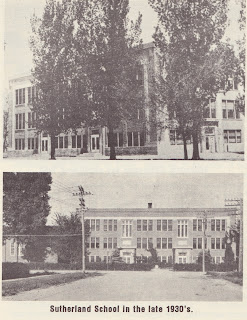Sunday Stories: I Remember Sutherland by Rodney Fye Part 3
Part three of the reminiscences of Rodney W. Fye as recorded in the 1881 - 1981 Sutherland Centennial Book.
My wage was $20 a month. When Waldo Warren got me, he also
got The Log, the local high school paper, of which I was the editor, and he was
thus guaranteed a weekly supply of school news, to which he devoted an entire
page each week. I was given complete freedom over style and the content of that
page I was responsible for weekly. When I left his employ after a year, he
said, “If I were you, I’d forget about ever being a printer. You don’t really
have the aptitude for that end of it. You’ll do much better if you concentrate
on the editorial and writing part of publishing and stay away from the ink and
presses.” I think I had just allowed the giant presses to chew up several yard
of newsprint. Whenever that happened, hundreds of stamp-sized pieces of paper
had to be picked off the drum and out of the ink which had the consistency of
molasses.
My job at the Courier transformed me from a rebel without a
cause into a responsible teenager with one. Whereas my overactive mind and
energy had been devot3ed to thinking up ways to punish and thwart the school
authorities for what I thought was their authoritarian lack of attention to our
social needs, I now had the “considerable, I thought) responsibility of
producing weekly something of value for the community, for which I was earning
approval, praise, and encouragement, commodities which, with but a couple of
exceptions, I’d found in short supply in my relationship with school
administrators.
I got encouragement from Beth Sarrah (Mrs. Marvin McNeel) to
get a college education and pursue a writing career, but she was an exception
among my teachers. Some had already written me off as a failure in school and
were willing to wager on lack of success in life. I’ve been a teacher (Subject:
English to the brightest 40 students at the best high school in Utah). I know
now that I was a problem student at Sutherland and I would be classified as a
juvenile delinquent today in any high school I’ve ever taught. I have to admit
that in my approximately ten years of teaching young adults, I’ve never taught
a student as challenging as I must have been. I was even expelled from high
school in one awful, terrifying moment. The words still thunder in my ears:
“You have been an organizer and a disruptive influence. We do not want or need
your kind in our school. You are expelled and you are not welcome to ever come
back.”
I know now I probably deserved to be expelled for a lot of
reasons, but not for the reasons I was given. If only I’d had a Bill Fulcher to
challenge me and show me how to afford a college education, I might have been
so busy preparing for college I knew was possible that I think I would not have
had time to be a problem to anyone. But best of all, I would not have had to
struggle so hard the next fifteen years to get a college education. I was so
convinced after my high school experience I was without academic ability that
it came as a tremendous shock at 35 years of age to discover that not only
could I handle regular college work, I could even go to graduate school.
I became the first in my mother’s family in 100 years to get
a college education and only the second in my father’s family to earn an
advanced degree. A college education was an expensive luxury people of our
class did not expect to attain. Class consciousness in Sutherland? (Yes, in my
growing up years, Sutherland possessed a class consciousness that exceeded
anything that exists in sophisticated San Francisco).
My parents had such complete and unquestioning confidence in
the school system that any punishment I ever received in school was doubled on
my arrival home. And to make sure, my mother seemed to have spies everywhere in
the faculty who made sure the news of my misbehavior preceded my arrival at the
dinner table. On the day I was expelled, my Grandfather Combs was so disgraced,
he refused to speak to me or even acknowledge my presence in the room for the
shame I’d brought on the family for being “an organizer and a disruptive
influence.” He was a law-and-order man who once threatened to whip me good when
he heard I’d attended a dance without paying the 50 cents admission. “No
grandson of mine will ever fail to pay his own way…” etc.
My mother was beside herself on the day of my expulsion,
filled with as much shame as if I’d been excommunicated from the whole
educational process for all eternity, which I in fact had been. There was
nowhere to finish school if not Sutherland; although for a week until I was
invited back to school I was secretly making plans to relocate to Hershey and
graduate there under an alias. In short, I was well served by every experience
in my home town except school. As a former educator myself I know things for me
could have been / should have been better. I am truly sorry for my teachers, especially
for those whose lives I may have shortened, that I wasn’t more cooperative. I’m
gratified to see the conditions are better for today’s SHS student than they
were for me in 1946. I have good reasons to support the alumni fund as
generously as I am able if it will save just one student from the agony I
experienced trying to overcome unnecessary obstacles in getting a college
education.



9C69D4BA5A
ReplyDeletekiralık hacker
hacker arıyorum
kiralık hacker
hacker arıyorum
belek